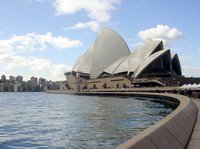Sydney Symphony Orchestra
|
|
Sydney Symphony Orchestra is a symphony orchestra based in Sydney, Australia. It is Australia's leading orchestra and the busiest in the nation.
The Sydney Symphony Orchestra evolved from a small group of twenty-four musicians which were brought together to play concerts and to provide incidental music for radio plays when the Australian Broadcasting Corporation (ABC) was established in 1932.
The first significant concert event in which the orchestra took part was in 1934, when the renowned Irish conductor Sir Hamilton Harty visited Australia. His visit led to calls for the creation of a permanent symphony orchestra for Sydney.
In 1936, the Sydney orchestra was increased to 45 players, augmented to 70 for public performances. It also inaugurated annual concert seasons that year.
Because of the political instability in Europe in the 1930s, many leading artists spent large amounts of time in Australia. Performances were given under the direction of the Hungarian conductor Antal Dorati and the British conductor Sir Thomas Beecham. Soloists appearing with the orchestra included Arthur Rubinstein, Bronislaw Huberman and Artur Schnabel.
At the end of World War II, the ABC reached agreement with the Sydney's city council and the New South Wales state government to establish an orchestra in Sydney. The new 82-player Sydney Symphony Orchestra gave its first concert in January 1946.
Eugene Goossens joined the orchestra as its first chief conductor in 1947. Goossens introduced outdoor concerts and conducted Australian premieres of contemporary music. In 1948, he uttered the prophetic words: "Sydney must have an opera house!"
Goossens was succeeded by the Dutch conductor Willem van Otterloo. Under Van Oterloo, the Sydney Orchestra made an eight-week European tour in 1974 culminated in two concerts in Amsterdam and The Hague. Under Otterloo, the orchestra established the Concert Hall of the Sydney Opera House as its home base.
In 1982 Sir Charles Mackerras became the first Australian to be appointed chief conductor. When he fell ill in 1985, the young Australian conductor Stuart Challender stepped in to conduct some of his performances. These concerts led to his appointment as the orchestra's chief conductor in 1987.
In 1994, the orchestra received increase support from the federal government, enabling it to increase the number of players to 110, increase touring and recording ventures, and improve orchestral salaries. That year, it also appointed the Dutch conductor Edo de Waart the orchestra's chief conductor and artistic director, who held the post until 2003. Highlights of his tenure in Sydney include the Ring in concert version and tours of Europe (1995), Japan (1996) and the US (1998).
The orchestra gives 150 concerts annually to an audience of 350,000
From February 2004, Gianluigi Gelmetti will be its chief conductor and artistic director.
External link
- Sydney Symphony Orchestra website (http://www.symphony.org.au)

